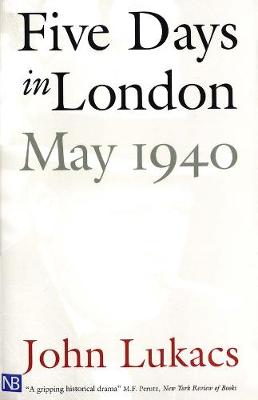Nota Bene
2 total works
A clear-eyed view of Winston Churchill, the workings of his historical imagination, and his successes and failures as a statesman, by the celebrated historian of World War II and best-selling author of Five Days in London, May 1940
John Lukacs has spent a lifetime considering the complex personality and statesmanship of Winston Churchill. In previous books Lukacs has told the story of Churchill's titanic struggle with Adolf Hitler in the early days of World War II. Now, in Churchill: Visionary. Statesman. Historian., he turns his attention to Churchill the man and visionary statesman.
Each chapter of this book provides an essential portrait of Churchill. Lukacs treats Churchill's vital relationships with Stalin, Roosevelt, and Eisenhower, as well as his complex, farsighted political vision concerning the coming of World War II and the Cold War. Lukacs also assesses Churchill's abilities as a historian looking backward into the origins of the conflicts of which he was so much a part. In addition, the author examines the often contradictory ways Churchill has been perceived by critics and admirers alike. The last chapter is a powerful and deeply moving evocation of the three days Lukacs spent in London attending Churchill's funeral in 1965. In Churchill: Visionary. Statesman. Historian., Lukacs deftly sets forth the essence of this towering figure of twentieth-century history with the consummate mastery of a great historian.
John Lukacs has spent a lifetime considering the complex personality and statesmanship of Winston Churchill. In previous books Lukacs has told the story of Churchill's titanic struggle with Adolf Hitler in the early days of World War II. Now, in Churchill: Visionary. Statesman. Historian., he turns his attention to Churchill the man and visionary statesman.
Each chapter of this book provides an essential portrait of Churchill. Lukacs treats Churchill's vital relationships with Stalin, Roosevelt, and Eisenhower, as well as his complex, farsighted political vision concerning the coming of World War II and the Cold War. Lukacs also assesses Churchill's abilities as a historian looking backward into the origins of the conflicts of which he was so much a part. In addition, the author examines the often contradictory ways Churchill has been perceived by critics and admirers alike. The last chapter is a powerful and deeply moving evocation of the three days Lukacs spent in London attending Churchill's funeral in 1965. In Churchill: Visionary. Statesman. Historian., Lukacs deftly sets forth the essence of this towering figure of twentieth-century history with the consummate mastery of a great historian.
Washington Post Book World Bestseller
"Customers are raving about Five Days in London."-Amazon.com
"Gripping. . . . Lucaks's story is not new . . . but [he] has transformed it into a memorable drama."-M.F. Perutz, New York Review of Books
The days from May 24 to May 28, 1940 altered the course of the history of this century, as the members of the British War Cabinet debated whether to negotiate with Hitler or to continue what became known as the Second World War. The decisive importance of these five days is the focus of John Lukacs's magisterial new book.
Lukacs takes us hour by hour into the critical unfolding of events at 10 Downing Street, where Churchill and the members of his cabinet were painfully considering their war responsibilities. We see how the military disasters taking place on the Continent-particularly the plight of the nearly 400,000 British soldiers bottled up in Dunkirk-affected Churchill's fragile political situation, for he had been prime minister only a fortnight and was regarded as impetuous and hotheaded even by many of his own party. Lukacs also investigates the mood of the British people, drawing on newspaper and Mass-Observation reports that show how the citizenry, though only partly informed about the dangers that faced them, nevertheless began to support Churchill's determination to stand fast.
Other historians have dealt with Churchill's difficulties during this period, using the partial revelations of certain memoirs and private and public papers. But Lukacs is the first to convey the drama and importance of these days, and he does so in a compelling narrative that combines deep knowledge with high literary style.
"Customers are raving about Five Days in London."-Amazon.com
"Gripping. . . . Lucaks's story is not new . . . but [he] has transformed it into a memorable drama."-M.F. Perutz, New York Review of Books
The days from May 24 to May 28, 1940 altered the course of the history of this century, as the members of the British War Cabinet debated whether to negotiate with Hitler or to continue what became known as the Second World War. The decisive importance of these five days is the focus of John Lukacs's magisterial new book.
Lukacs takes us hour by hour into the critical unfolding of events at 10 Downing Street, where Churchill and the members of his cabinet were painfully considering their war responsibilities. We see how the military disasters taking place on the Continent-particularly the plight of the nearly 400,000 British soldiers bottled up in Dunkirk-affected Churchill's fragile political situation, for he had been prime minister only a fortnight and was regarded as impetuous and hotheaded even by many of his own party. Lukacs also investigates the mood of the British people, drawing on newspaper and Mass-Observation reports that show how the citizenry, though only partly informed about the dangers that faced them, nevertheless began to support Churchill's determination to stand fast.
Other historians have dealt with Churchill's difficulties during this period, using the partial revelations of certain memoirs and private and public papers. But Lukacs is the first to convey the drama and importance of these days, and he does so in a compelling narrative that combines deep knowledge with high literary style.

